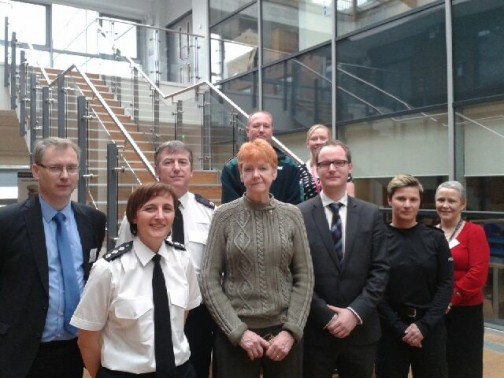

Action in Newcastle leads to drop in number of legal high incidents
10th March 2016
Northumbria Police and Crime Commissioner, Vera Baird, is praising the work of a taskforce set up in Newcastle to tackle New Psychoactive Substances (NPS), otherwise known as ‘legal highs’.
Compared to figures in January, and following the taskforce’s launch, February has seen the force experience a 51.7% per cent fall in the number of calls relating to ‘legal highs’, while calls to the North East Ambulance Service have dropped by 63.1%.
The taskforce, which consists of Northumbria Police, North East Ambulance Service and Newcastle City Council, follows a conference last November where research funded by Vera Baird revealed the true impact the growing NPS trend has been having on the communities of Newcastle since 2012.
The majority (53%) of NPS-related incidents responded to by Northumbria Police in 2014 took place in Newcastle. At 35%, Newcastle also reported the highest proportion of people accessing drug treatment services for NPS-related problems compared to anywhere else in the country.
Northumbria Police and Crime Commissioner, Vera Baird, said: “I have been a determined campaigner on this issue, calling for the Government to take firm action against those who make these products and those who sell them. Firm action is certainly being taken here in Newcastle and through excellent partnership working we have the results to prove it.
“Local residents can rest assured this is a top priority for me and I will ensure our officers do everything within their power to get those selling these substances before the courts so we can prevent people from getting addicted to them and putting their lives at risk. We cannot, nor should we, tolerate the sale of legal highs on the streets of Newcastle.”
The work of the taskforce, which aims to disrupt those selling ‘legal highs’ and do everything possible to get them from off the streets of Newcastle, is paying off.
In February (2016) the North East Ambulance Service received 97 calls involving legal highs compared to the 263 they got in January. The police received 85 calls compared to the 176 in January.
Work has included; undercover police test purchase operations, the execution of search warrants and legal seizures and community protection notice warnings being given from the local authority to businesses thought to be selling ‘legal highs’ threatening them with prosecution if they continued selling them. One business premises in the west of Newcastle was even forced to close.
Alongside this all partners have been involved in educational and engagement work spreading the word across the city about just how dangerous ‘legal highs’ can be.
Although positive that the numbers have fallen, and the message is getting across to some people, police in Newcastle aren’t being complacent and will continue to work with partners to keep on top of the issue.
Superintendent Richard Jackson said: “It’s good to see that the numbers of incidents involving legal highs have dropped and that the hard work that has been put in by officers and staff from all of the partner agencies is having a positive effect in the city. But we have no plans to let up yet.
“The aim of the task force was to find those responsible for selling legal highs and do as much as we could to make life difficult for them to do so, and the feedback we are getting from the streets is that legal highs have become harder to buy than ever before.
“We will continue to target these dealers and take action, and work together with our partners to make sure Newcastle remains a safe city.”
Head of Resilience and Special Operations at North East Ambulance Service, Simon Swallow, said: “These so-called legal highs are not safe to use and carry a serious health risk and are putting people’s lives at risk.
“We raised our operational status to “Severe Pressure” in December as result of growing demand on the service during winter and these call-outs are putting an additional burden on our service by preventing us from being available to attend other life-threatening emergencies such as heart attacks and strokes.
“We are urging people NOT to take these so-called legal highs as they are putting their own lives in danger and also endangering the lives of others because these calls are potentially delaying our response to someone else who is suffering a heart attack or other life-threatening condition.”
Cabinet Member for Neighbourhoods and Regulatory Services, Cllr Nick Kemp, said: “I am delighted that after the recent spike in legal high call-outs we have seen a drop in incidents. It’s a great example of what can be achieved when agencies come together and work closely with communities. Legal highs are a real and present danger to anyone who takes them, and as far as I am concerned the legislation that bans them can’t come quick enough.
“I hope that communities remain vigilant and contact the authorities if they see anyone dealing in them. The council will not hesitate to issue warning letters to those dealing in them as we can never be complacent about something as dangerous as legal highs.”






